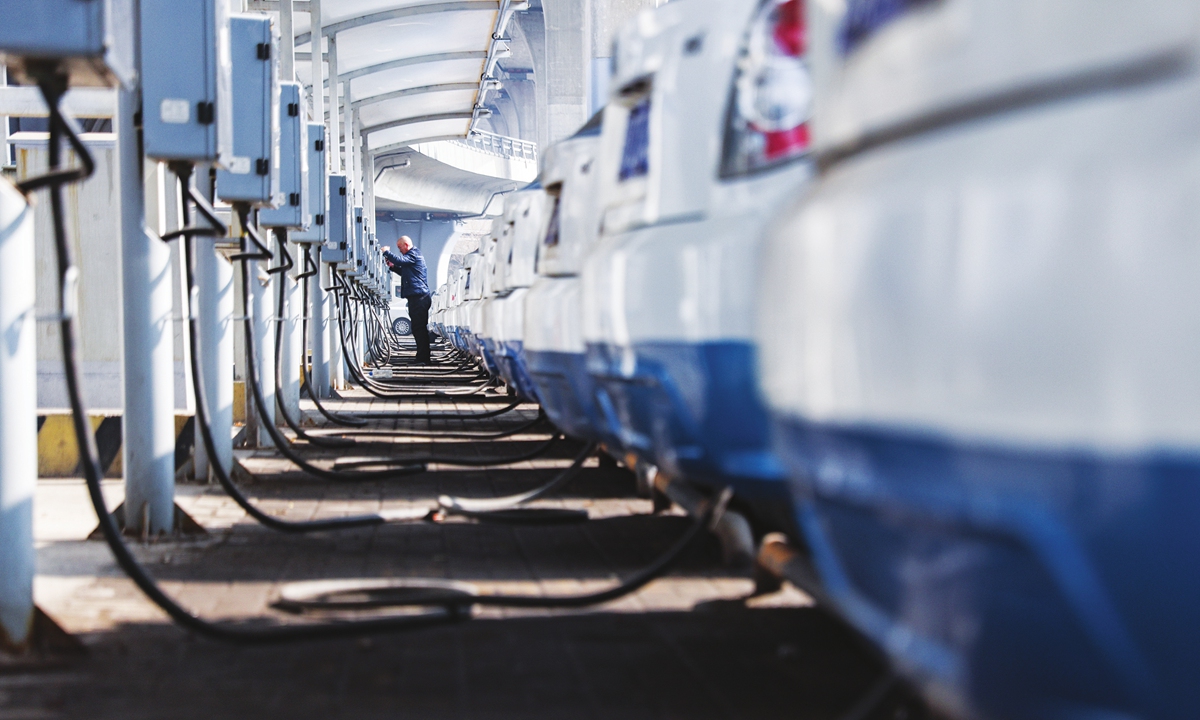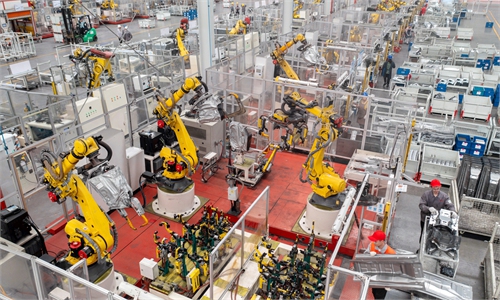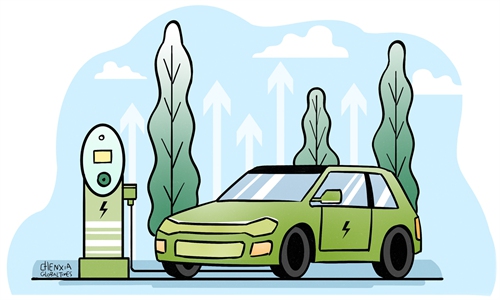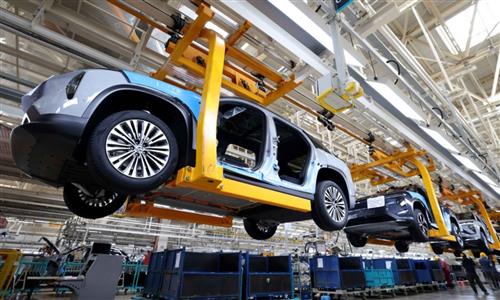
An NEV charging station in Taiyuan, North China's Shanxi Province Photo: VCG
The Chinese auto market has continued to gain pace as the government pushes for the rapid development of the new-energy vehicles (NEVs) in its bid to mitigate climate change.
Data from the China Passenger Car Association showed that retail sales of passenger vehicles rose for a fifth consecutive month in June, up 8.7 percent month-on-month to 1.891 million units. The month-on-month increase in June car sales marked the first consecutive increase in first-half car sales since 2001, the association said.
Retail sales of NEVs including electric vehicles and plug-in hybrid vehicles rose 25.2 percent year-on-year to 665,000 units in June, the association said.
The booming NEV market is also gaining the attention of foreign players, with many automakers stepping up their investment in Chinese market.
In a recent interview with the Global Times, Katy Tsang, Audi China Executive Vice President of Sales and Marketing, said sales growth of Audi fuel vehicles remained stable in the first five months of this year, "basically at the same level as the rapidly-growing Chinese auto market."
"We are more surprised that the strong growth is coming from pure electric models, including the Audi Q4 e-tron and Q5 e-tron, which have achieved a nearly five-fold increase", she said.
Overall sales of new energy vehicles increased by 288 percent year-on-year in the first five months, she added.
For Audi, the Chinese market was, is, and will be one of the most important markets, said Hildegard Wortmann, Member of the Board of Management of AUDI AG Sales and Marketing.
Wortmann said that, from the start of the second half of this year, Audi will launch the largest products marketing campaign in the company's history on a global scale. New products will be launched into the market incessantly.
In the future, we will continue to firmly implement the concept of "in China, for China" and increase R&D and market investment, Wortmann said.
Audi has started construction of its first electric vehicle-only plant in Changchun, in Northeast China's Jilin Province, as part of the expansion of its local e-product portfolio and is building a new production plant for all-electric Audi models. With an investment of 2.6 billion euros ($2.77 billion), the plant is set to be completed in 2024.
"The investment is the best illustration of our deep cultivation of the Chinese market," Wortmann said.
Chinese government has taken more concrete measures to support NEV sales. Chinese authorities last month announced this year's promotional campaign for NEVs in rural areas in Wuxi in East China's Jiangsu Province, Qionghai in South China's Hainan Province, and Jingmen in Central China's Hubei Province.
The activity will last from June to December, according to the Ministry of Industry and Information Technology, one of five government departments that launched the activity, and a total of 69 NEV models will be featured.
The Chinese government has extended its preferential purchase tax policy for NEVs to the end of 2027, which aims to support the NEVs sector's development and stimulate automobile consumption.
The booming NEV market has also led to more technological breakthroughs.
The European Patent Office (EPO) announced recently that the Chinese scientist Wu Kai and his team are winners in the 'Non-EPO countries' category of the European Inventor Award 2023. Selected from over 600 candidates, Wu and his team developed a Lithium-ion battery with a top cover that acts as a barrier to mitigate battery safety risks. The invention helps ensure the safety of vehicles equipped with lithium-ion (Li-ion) batteries containing a flammable electrolyte.
Li-ion batteries are more sustainable with their lighter weight, faster charging capacity, and lower heat generation, ultimately providing cleaner energy. However, overcharging Li-ion batteries has been an issue for decades in the car industry. Yet Wu and his team were able to deliver their solution to China's largest automotive lithium-ion battery maker CATL, in just two and a half years.
Wu said that in the energy storage industry, lithium-ion batteries have a broader application scenario and development space, according to the EPO.



